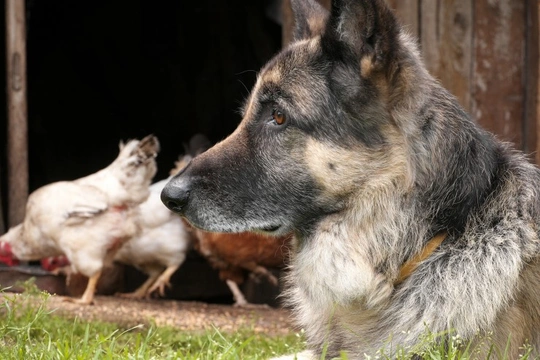
Can dogs pick up lice from chickens?
A lot of people who keep chickens also have pet dogs and if they are used to being with each other, they typically get on well together. This, of course, means that a dog comes into contact with their poultry companions on a daily basis and many owners wonder if their dogs can catch lice and other parasites off the hens. The simple answer is no, poultry lice cannot live off dogs (or humans) which means there is no chance of them suffering from an infestation although they may get bitten from time to time.
If lice drop off a hen or cockerel, it might get onto a dog and the parasite may take a bite out of them while in their coats. This may cause irritation and the dog would, as a result, feel quite uncomfortable while the parasite hitches a temporary ride on them. This can also mean that a dog might well take the lice into the home where they can then take a bite out of family members too, but these parasites cannot live of a person either which means although they will take a bite and cause itchy skin, the lice would not stay on the person.
Poultry lice are what is referred to as species-specific which in short, means they can only live on an avian host. With this said, chicken mites as well as red mites are more likely to be the culprits should a dog suddenly develop a skin irritation that causes them to scratch like mad. It is worth noting however, that although red mites and chicken mites might be responsible for a flare up, they too cannot exist on dogs or other furry animals and pets.
The types of poultry parasites that will take a bite
There are several types of poultry parasites that will take a bite out of a furry companion, but which cannot live off them and this includes the following:
- Dermanyssus gallinae - a common parasite found on chickens
- Chicken mites - these small parasites only measure 1mm and are spider-like often transferred to poultry by wild birds
- Poultry lice - a parasite that does not generally transfer onto dogs
Should some poultry lice have got into a dog's coat and have caused skin irritation, it's time to treat a flock and their housing with specific products that effectively kill off the parasites. It's also a good idea to keep on top of parasite treatments for dogs too which will also deter poultry lice and mites from temporarily taking up residence in a dog's coat.
What about other types of lice?
Lice in dogs are species-specific and therefore need to live on a canine host to survive. Dogs that have picked up canine lice will have itchy skin and sore, irritated skin. In very severe cases where a dog has an infestation which can cause anaemia and if not treated in a timely manner, it can be very serious. The signs of there being a problem include the following, bearing in mind that the problem would be caused by lice that need a canine host which are known as Trichodectes canis or Linognathus setosus and NOT poultry lice:
- Scratching
- Biting or rubbing skin
- Irritated and red skin
- Restlessness
- Loss of condition and weight
The good news is there are lots of very effective treatments for canine lice and if necessary a vet would even be able to prescribe a medication if a dog picks them up in a park when meeting other dogs or anywhere else they might come into contact with dogs that might have canine lice and this includes kennels and even veterinary surgeries.
Conclusion
Providing chickens and other poultry are regularly checked and treated for lice and other parasites, the risk of a dog being bitten are greatly reduced. However, as previously mentioned, poultry lice and other parasites they can pick up are species-specific and therefore although they might take a bite out of a dog, they cannot survive on a canine host, but they can cause irritation and discomfort.



